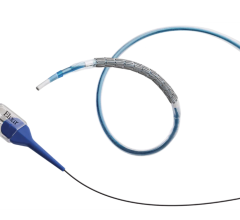May 23, 2012 — Boston Scientific Corp. announces that the Synergy everolimus-eluting bioabsorbable polymer-coated platinum chromium coronary stent demonstrated noninferior results in treating de novo coronary artery lesions at one year compared to the Promus Element everolimus-eluting platinum chromium stent in the EVOLVE first human use trial. The trial reported one-year clinical and six-month intravascular ultrasound (IVUS) outcomes data, evaluating the safety and effectiveness of the bioabsorbable abluminal polymer-coated Synergy stent. Results were presented today at the annual EuroPCR Scientific Program in Paris by Stefan Verheye, M.D., Ph.D., FESC, senior interventional cardiologist at the Antwerp Cardiovascular Institute, ZNA Middelheim Hospital, Belgium.
The EVOLVE trial previously reported the primary angiographic and clinical endpoints of noninferiority of the Promus stent compared with Promus Element for late loss at six months and target lesion failure (TLF) at 30 days. The EVOLVE one-year trial data demonstrated that both versions of the Synergy stent (loaded with both full- and half-dose everolimus) are clinically noninferior to the Promus Element stent. There were no significant differences between groups for all IVUS parameters evaluated at 6 months, including neointimal area, stent or lumen area, net volume obstruction, incomplete stent apposition or minimum lumen diameter.
"The six-month IVUS data suggest that anti-restenotic activity is maintained with the Synergy stent, even after four months, when the drug and polymer coating are designed to be absorbed. Importantly, the Synergy stent has shown equivalent clinical safety and effectiveness in the EVOLVE data compared to the Promus Element stent. We continue to observe very low rates of revascularization and no cardiac-related deaths or stent thrombosis with Synergy at one year," said Verheye. "The EVOLVE data demonstrate the effectiveness of drug elution from an ultra-thin, abluminal bioabsorbable polymer with this innovative coronary stent platform."
At one year, TLF in both study arms was not statistically different from the Promus Element Stent (4.4 percent, 4.2 percent and 5.1 percent for the full-dose Synergy Stent, half-dose Synergy stent and Promus Element stent, respectively; p=1.00 for superiority comparison of each Synergy Stent version with the Promus Element stent). TLF is defined as target-vessel-related cardiac death, target-vessel-related myocardial infarction (MI), or ischemia-driven target lesion revascularization (TLR). Clinical follow-up at one year demonstrated no cardiac related deaths, Q-wave MI, or stent thrombosis for any of the stent groups. Periprocedural non-Q-wave MIs had previously been observed in one patient in the full-dose Synergy arm and three patients in the half-dose Synergy arm; an additional two non-Q-wave MIs occurred between six and 12 months in the full-dose Synergy arm; however, these were not considered related to the stent. Non-Q-wave MI rates were not significantly different between groups at any time point up to and including one year (3.3 percent for full-dose Synergy [p=0.11], 3.2 percent for half-dose Synergy [p=0.12], each compared to 0 percent for Promus Element). TLR was 1.1 percent for both Synergy doses versus 5.1 percent for Promus Element (p=0.21). Additionally, target vessel revascularization (TVR) was noted to be numerically lower with the Synergy stent, but the difference was not statistically significant (3.3 percent for full-dose Synergy [p=0.09] and 4.2 percent for half-dose Synergy [p=0.17] each compared to 9.2 percent for Promus Element).
"The Synergy stent is a next-generation everolimus-eluting stent that combines the same platinum chromium alloy and similar design used in the Promus Element stent with a novel coating created to significantly reduce the amount of polymer and drug to which the blood vessel wall is exposed, without compromising inhibition of neointimal growth," said Keith D. Dawkins, M.D., global chief medical officer for Boston Scientific. "Synergy is designed to address potential limitations with durable polymer coatings used on currently available drug-eluting stents, including issues with dual antiplatelet therapy interruption and duration. We continue to be pleased with the impressive clinical and angiographic results from the EVOLVE trial for this advanced coronary stent technology."
EVOLVE trial data are expected to support CE mark approval for the Synergy stent, which is expected as early as later this year, while additional larger studies are anticipated to further assess clinical event rates and the potential for reduced dual antiplatelet therapy with this novel stent technology.
The Synergy stent is an investigational device, limited by applicable law to investigational use only and not available for sale.
For more information: www.bostonscientific.com


 July 02, 2024
July 02, 2024 









